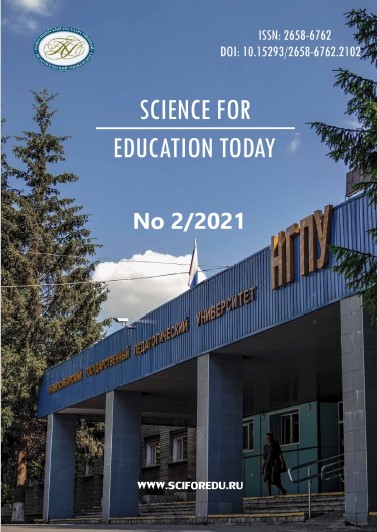Взаимосвязь между оценкой сформированности конфликтологической составляющей образа педагога и желанием работать по профессии у будущих учителей
Relationship between the assessment of the formation of conflict resolution component in the teacher's image and the desire to enter the teaching profession
Author(s): Tatyana Genad`evna Ptashko, Elena Gennadyevna Chernikova, Artem Evgenevich Perebeynos, Nadezhda Valeryevna Sivrikova, Nadezhda Anatolyevna SokolovaSubject(s): Education, Personality Psychology, Psychology of Self
Published by: Новосибирский государственный педагогический университет
Keywords: Future teacher; Motivation for teaching; Conflict resolution component of the teacher's image; Teacher's image; The structure of the teacher's image; Self-determination in professional activity;
Summary/Abstract: Introduction. The article attempts to study the correlation between the desire to enter the teaching profession and the formation of the conflict resolution component in the teacher’s image. The purpose of the article is to identify and describe the relationship between the assessment of the formation of the conflict resolution component in the teacher’s image and the desire to pursue a career in education. Materials and Methods. The study is based on the systematic approach and uses theoretical and empirical research methods. To collect primary empirical data, a survey of undergraduates doing their degrees in education was conducted. The study involved 152 undergraduate students (Years 2-5). For the mathematical processing of the research data, the H - Kruskal Wallace test and factor analysis were used Results. The factor analysis revealed two factors within the structure of the conflict resolution component of the teacher’s image. Its content differs when students assess school teachers, university teachers and themselves. According to students’ perceptions, the structure of conflict resolution component of the school teacher’s image and of the image of the university teacher coincide to a great extent. On the other hand, the structure of conflict resolution component of future teachers’ ‘self-image’ differs. ‘Refusing violence’ in the second factor is associated with ‘following rules’ for students, and with ‘personal choice’ for university teachers and school teachers. The research findings indicate that students with different degrees of professional motivation have different perceptions of the formation of conflict resolution component within professional images of university teachers, school teachers and themselves. When assessing school teachers and university teachers, significant differences were found according to the ‘internal stability’ criterion. ‘Doubting students’ rated university teachers lower according to this criterion, on the other hand, ‘students who do not want to enter the teaching profession’ rated this criterion low both among school teachers and university teachers. Conclusions. The study reveals the correlation between the assessment of conflict resolution component of the teacher's image and motivation for entering the teaching career. The article concludes that the desire to pursue a career in education is associated with such components of the teacher's image as ‘positive goals’, ‘equal communication’ and ‘personal choice’. Low self-evaluation of students’ conflict resolution component of the teacher's image negatively affects the motivation for teaching career in the future.
Journal: Science for Education Today
- Issue Year: 11/2021
- Issue No: 2
- Page Range: 32-54
- Page Count: 23
- Language: Russian

